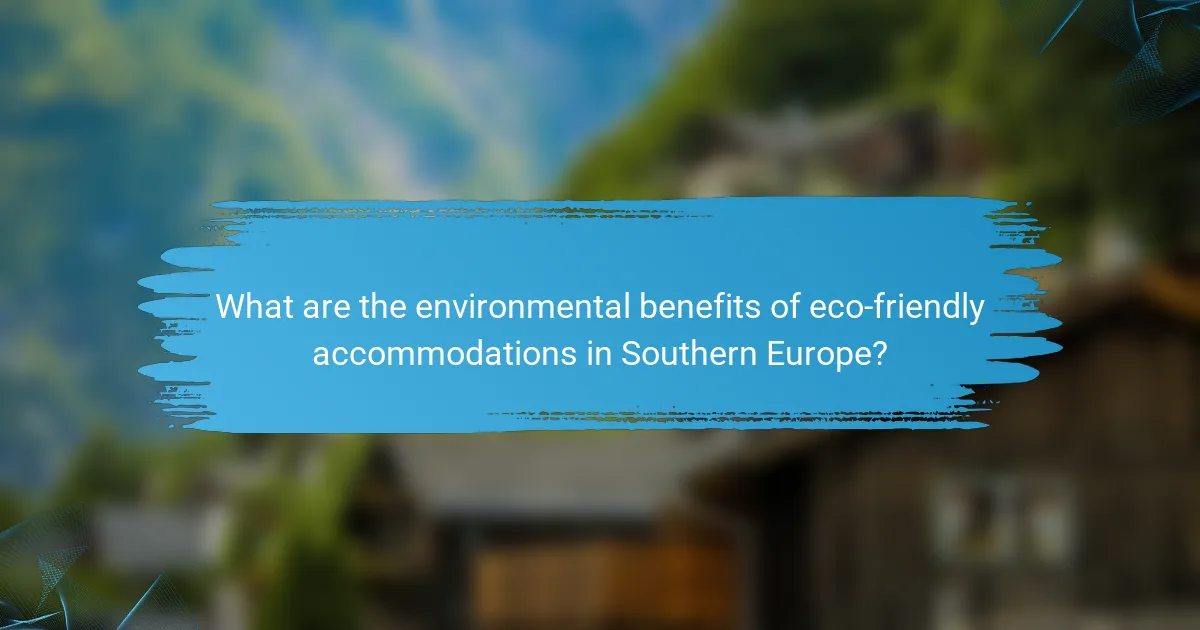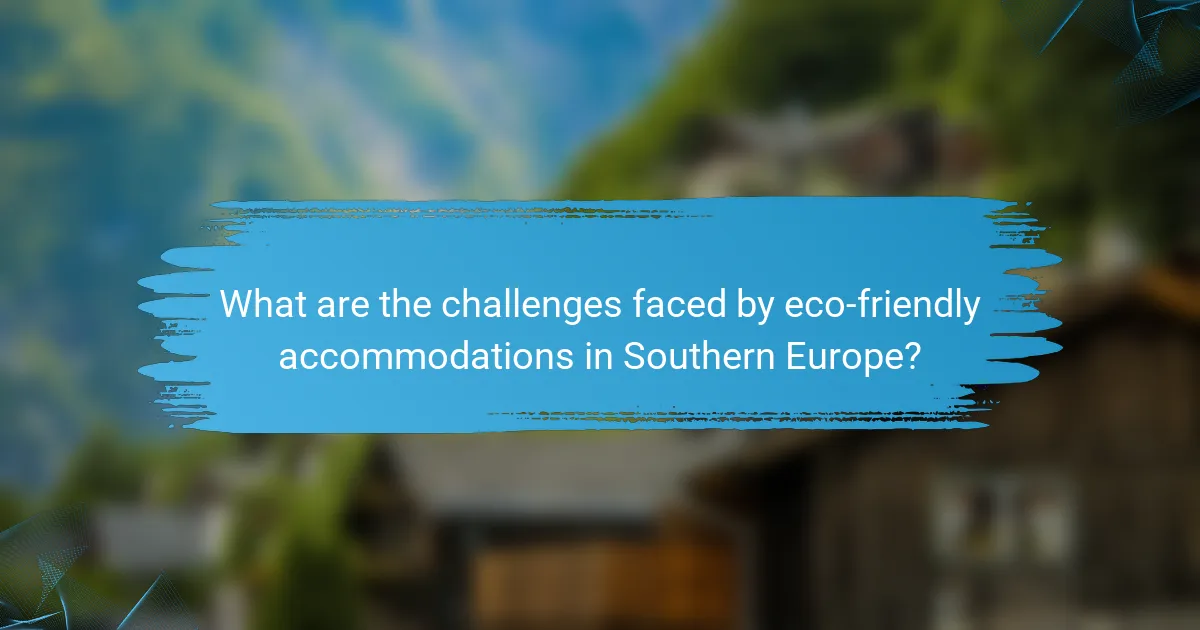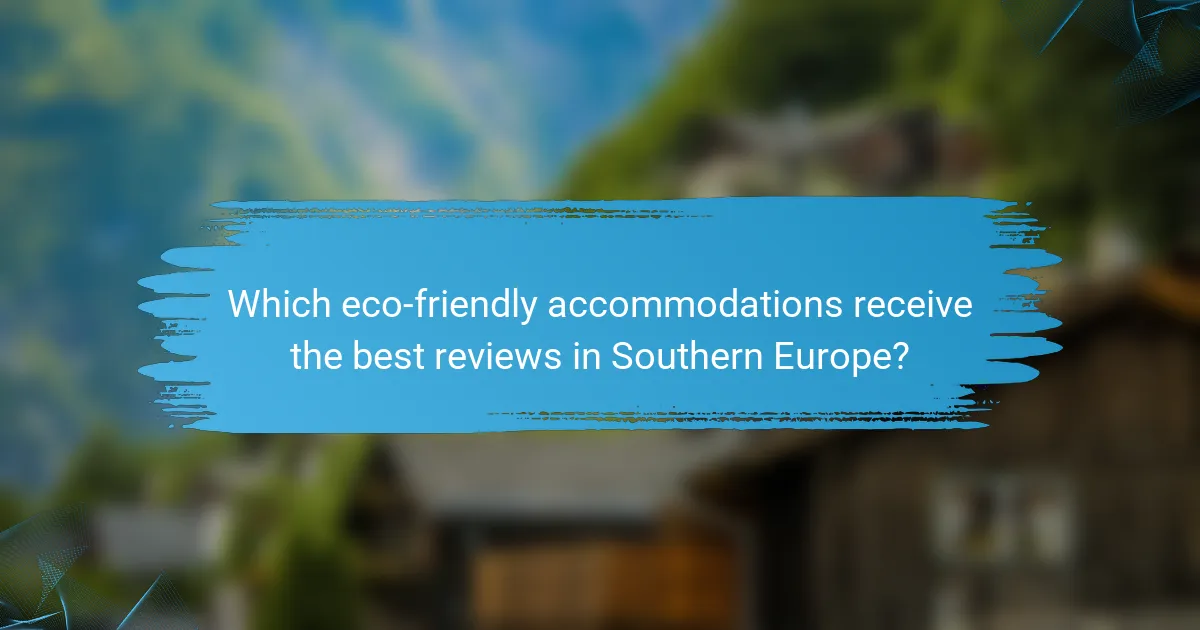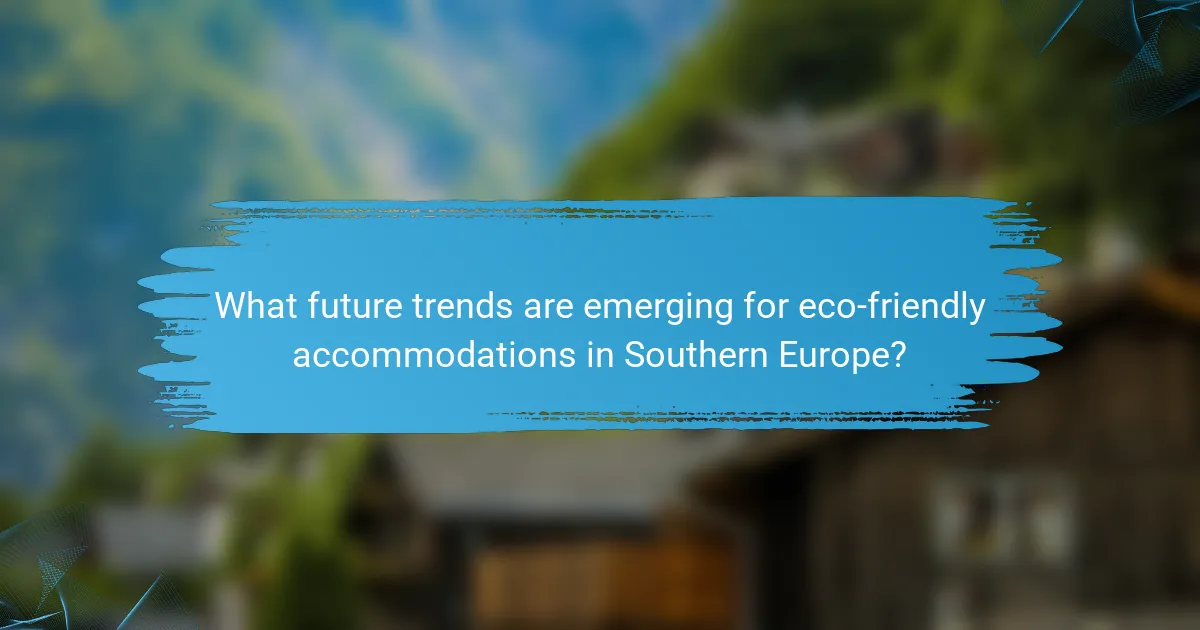Eco-friendly accommodations in Southern Europe offer travelers a sustainable way to enjoy their vacations while minimizing their environmental impact. These establishments promote energy efficiency, utilize renewable resources, and support local ecosystems. Guests can expect unique features like organic meals and educational programs about local ecology. Positive reviews highlight their commitment to responsible tourism and exceptional service, making them increasingly popular among eco-conscious travelers.

What are the environmental benefits of eco-friendly accommodations in Southern Europe?
Eco-friendly accommodations in Southern Europe significantly reduce environmental impact. They promote sustainable practices, conserve energy, and utilize renewable resources. Many establishments implement waste reduction strategies, contributing to lower carbon footprints. These accommodations often support local ecosystems and biodiversity, enhancing natural surroundings.
How do eco-friendly accommodations reduce carbon footprints?
Eco-friendly accommodations significantly reduce carbon footprints by implementing sustainable practices. These establishments often utilize renewable energy sources, such as solar or wind power, which lowers greenhouse gas emissions. Additionally, eco-friendly accommodations prioritize energy efficiency through advanced insulation and energy-saving appliances. They often source local and organic materials, reducing transportation emissions. Water conservation measures, like low-flow fixtures, further minimize environmental impact. By promoting sustainable tourism, these accommodations encourage guests to adopt eco-conscious behaviors, amplifying their positive effects on the environment.
What role do local materials play in sustainable building practices?
Local materials significantly enhance sustainable building practices by reducing transportation emissions and promoting resource efficiency. They often possess unique attributes, such as improved thermal performance, which can lead to energy savings. In Southern Europe, the use of local stone, clay, and timber not only supports regional economies but also aligns with eco-friendly accommodation designs. These materials contribute to lower environmental impact and foster a connection to local culture, making them ideal for sustainable architecture.
How do eco-friendly accommodations promote biodiversity?
Eco-friendly accommodations promote biodiversity by integrating sustainable practices that protect local ecosystems. These establishments often use renewable resources, minimize waste, and support conservation efforts. For example, many eco-friendly lodgings implement green roofs, which provide habitats for various species while improving air quality. They also often collaborate with local conservation organizations, fostering community engagement in biodiversity protection. By prioritizing native landscaping and reducing chemical use, these accommodations create environments conducive to wildlife, enhancing regional biodiversity.

What features distinguish eco-friendly accommodations in Southern Europe?
Eco-friendly accommodations in Southern Europe feature sustainable practices, energy efficiency, and eco-conscious design. These establishments often utilize renewable energy sources, such as solar panels, and incorporate local materials. Many offer organic food options and promote waste reduction through recycling programs. Unique attributes include certifications like Green Key or EarthCheck, which distinguish them from conventional hotels. Rarely, some accommodations provide educational programs about local ecology, enhancing the guest experience while fostering environmental awareness.
Which energy-efficient technologies are commonly used?
Common energy-efficient technologies used in eco-friendly accommodations include solar panels, energy-efficient HVAC systems, LED lighting, smart thermostats, and water-saving fixtures. These technologies reduce energy consumption and enhance sustainability. Solar panels can generate renewable energy, while energy-efficient HVAC systems optimize heating and cooling. LED lighting offers long-lasting illumination with lower energy use. Smart thermostats learn user behaviors to minimize waste, and water-saving fixtures reduce water usage without sacrificing comfort.
How do waste management systems vary among different accommodations?
Waste management systems among eco-friendly accommodations in Southern Europe vary significantly based on location and operational practices. Many utilize recycling programs, composting, and waste reduction strategies. For instance, some hotels implement on-site waste sorting, while others partner with local waste management services to ensure proper disposal. Additionally, accommodations may differ in their commitment to sustainability, with some offering educational programs for guests on waste reduction. This variance reflects the unique attributes of each establishment and their environmental goals.
What sustainable food practices are implemented in these accommodations?
Eco-friendly accommodations in Southern Europe implement various sustainable food practices, including sourcing local ingredients, minimizing food waste, and offering plant-based meal options. These practices support local economies and reduce carbon footprints. Many establishments emphasize organic farming and seasonal menus, ensuring freshness and sustainability. Additionally, some accommodations partner with local farmers to promote community-supported agriculture.

How do eco-friendly accommodations enhance guest experiences?
Eco-friendly accommodations enhance guest experiences by promoting sustainability, comfort, and unique local culture. These establishments often incorporate green technologies, such as solar panels and water-saving fixtures, which contribute to lower environmental impact. Guests benefit from healthier indoor environments created by using non-toxic materials and improved air quality.
Additionally, eco-friendly accommodations frequently offer organic meals sourced from local farms, enhancing the dining experience and supporting the community. Many guests appreciate the educational aspects, learning about sustainable practices and local ecosystems during their stay.
In Southern Europe, eco-friendly accommodations receive positive reviews for their commitment to responsible tourism, providing guests with a sense of fulfillment while enjoying their travels.
What unique amenities are offered in eco-friendly stays?
Eco-friendly stays offer unique amenities such as solar-powered energy systems, organic bedding, and locally sourced food options. These features enhance sustainability and create a more immersive experience. Many accommodations provide eco-tours and educational workshops, promoting environmental awareness. Some even include rainwater harvesting systems, ensuring minimal ecological impact.
How do eco-friendly accommodations cater to wellness and relaxation?
Eco-friendly accommodations enhance wellness and relaxation through sustainable practices and natural environments. These establishments often incorporate organic materials, promote outdoor activities, and offer wellness programs. Features like eco-spas, organic food options, and tranquil settings contribute to mental and physical well-being. As a result, guests experience reduced stress and improved health, making these accommodations ideal for rejuvenation.

What are the challenges faced by eco-friendly accommodations in Southern Europe?
Eco-friendly accommodations in Southern Europe face several challenges. Key issues include high operational costs, regulatory hurdles, and limited consumer awareness. These factors often hinder the growth and adoption of sustainable practices. Additionally, competition from traditional accommodations can make it difficult for eco-friendly options to thrive.
How do regulatory frameworks impact sustainability initiatives?
Regulatory frameworks significantly enhance sustainability initiatives in eco-friendly accommodations. They establish standards that promote environmentally responsible practices, ensuring compliance with sustainability goals. For example, regulations may mandate energy efficiency, waste reduction, and the use of renewable resources. These frameworks not only encourage innovation but also create a competitive advantage for accommodations that adopt sustainable practices. As a result, compliance can lead to improved guest satisfaction and loyalty.
What common misconceptions exist about eco-friendly accommodations?
Many misconceptions exist about eco-friendly accommodations, primarily regarding their cost and comfort. Some believe they are too expensive, but many offer competitive rates with traditional hotels. Others think eco-friendly options lack amenities, yet many provide high-quality services and luxurious experiences. Additionally, there is a notion that these accommodations are not stylish, while many feature contemporary designs that appeal to modern travelers. Lastly, some assume eco-friendly stays are limited to rural areas, but urban eco-hotels are increasingly available in major cities across Southern Europe.

Which eco-friendly accommodations receive the best reviews in Southern Europe?
Eco-friendly accommodations in Southern Europe that receive the best reviews include eco-lodges, sustainable hotels, and green guesthouses. These options are praised for their commitment to environmental sustainability, unique designs, and exceptional service. Notable examples are the eco-lodges in Costa Brava, which offer local organic cuisine and renewable energy sources. Additionally, hotels in the Amalfi Coast focus on waste reduction and water conservation, enhancing their appeal to eco-conscious travelers. Many of these accommodations have received high ratings on travel platforms for their eco-friendly practices and guest experiences.
What criteria do travelers use to rate eco-friendly accommodations?
Travelers rate eco-friendly accommodations based on sustainability practices, comfort, location, and guest reviews. Key criteria include energy efficiency, waste management, use of local materials, and commitment to community engagement. Many guests prioritize eco-certifications, reflecting their interest in genuine environmental efforts. Positive reviews often highlight unique attributes, such as organic food options and green spaces.
How do online platforms influence guest perceptions and reviews?
Online platforms significantly shape guest perceptions and reviews of eco-friendly accommodations in Southern Europe. User-generated content on these platforms showcases the sustainability features and benefits of these lodgings, influencing potential guests’ decisions.
Positive reviews highlight attributes such as energy efficiency, use of local materials, and commitment to reducing carbon footprints. For instance, accommodations that offer organic food and eco-tours often receive higher ratings.
Social media also plays a crucial role by amplifying authentic guest experiences, making eco-friendly stays more appealing. As a result, potential visitors are more likely to choose accommodations that demonstrate environmental responsibility, impacting overall perceptions and review scores.
In summary, online platforms enhance visibility and credibility for eco-friendly accommodations, driving guest interest and influencing their reviews.

What future trends are emerging for eco-friendly accommodations in Southern Europe?
Emerging trends for eco-friendly accommodations in Southern Europe include increased use of renewable energy, sustainable building materials, and local sourcing of food. These trends enhance energy efficiency and reduce carbon footprints. Additionally, many establishments are incorporating smart technology for better resource management. Unique attributes such as biophilic design are gaining popularity, creating spaces that connect guests with nature. As a result, travelers increasingly seek out these innovative and environmentally conscious options.
How is technology shaping the evolution of sustainable hospitality?
Technology is significantly enhancing sustainable hospitality by promoting eco-friendly accommodations. Innovations such as energy-efficient systems, smart resource management, and sustainable materials are becoming standard. For instance, solar panels and smart thermostats reduce energy consumption, while water-saving fixtures minimize waste.
Many eco-friendly accommodations in Southern Europe utilize local, sustainable materials, which supports regional economies and reduces carbon footprints. Reviews highlight guest satisfaction due to comfortable, sustainable experiences that align with environmental values.
Moreover, technology facilitates transparency in sustainability practices, allowing guests to make informed choices. This growing trend not only benefits the environment but also appeals to an increasingly eco-conscious traveler demographic.
What innovative practices are being adopted in the region?
Innovative practices in Southern Europe focus on sustainability and eco-friendliness in accommodations. Many hotels and lodgings are adopting solar energy systems, water conservation techniques, and organic materials in construction. These practices reduce environmental impact while enhancing guest experiences. For instance, some establishments offer local organic food options, promoting regional agriculture. Additionally, eco-certifications are increasingly common, helping travelers identify sustainable choices.
What can travelers do to support eco-friendly accommodations?
Travelers can support eco-friendly accommodations by choosing sustainable options, reducing energy consumption, and minimizing waste. Prioritize hotels with green certifications, utilize public transport, and engage in local conservation efforts. These actions enhance the benefits of eco-friendly stays, such as reduced carbon footprints and preservation of local ecosystems.
What are the best practices for choosing eco-friendly accommodations?
To choose eco-friendly accommodations, prioritize sustainability certifications, energy efficiency, and local sourcing. Look for properties that minimize waste and offer green amenities. Research guest reviews to gauge the commitment to environmental practices. Consider locations that promote eco-tourism and support local communities.